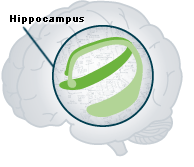
Scientist Spotlight:
Richard Frackowiak, M.D., Ph.D.
PROFESSOR OF NEUROLOGY, UNIVERSITY COLLEGE LONDON
Groundbreaking scientific studies over the past decade have unveiled important information about how the brain functions. Some of the most compelling studies have shown how the brain's natural plasticity—its ability to change—collaborates with our environments and activities to shape our brains (literally!). These findings have fascinating and potentially revolutionary implications for the future of brain health. They suggest that by changing our environment or activities in specific ways, we can redefine how our brains change over time.
Your Hippocampus Says a lot about You Your experiences can shape your brain. Just take a look at London's cab drivers.
Your experiences can shape your brain. Just take a look at London's cab drivers.
To have a "big heart" means you are kind and generous. But what does it mean to have a big hippocampus? According to the results of a study, it means you have strong dependence on navigational skills and a highly developed capacity for spatial representation of the environment.
Back in 1997, Richard Frackowiak, MD, PhD, professor of cognitive neurology at the Institute of Neurology, University College London, and his colleagues studied the brains of London cab drivers to see if there was a connection between their brains (their hippocampi) and their highly developed spatial and navigation skills.
They already knew that the hippocampus, a long ridge nestled in each cerebral hemisphere of the brain, played a role in spatial memory function. They knew that in birds, for example, environmental stimulation (doing activities that required the use of spatial memory) could engage brain plasticity processes, actually increasing the size of the hippocampi.

But they were not sure if the same was true about humans. Consequently, Dr. Frackowiak and his colleagues set out to determine if the human hippocampus played a specific role in spatial memory and if extensive spatial memory activities could affect the size of a human's brain.
London taxi drivers were an ideal group for this spatial memory study. These individuals go through a rigorous cab-driver training program known as "The Knowledge" before they are permitted to drive one of those famous London black taxicabs. While on The Knowledge for an "All-London" license, candidates spend about two years learning 320 routes, or "runs," which encompass about 25,000 streets within a six-mile radius.
 "Knowledge boys" or "knowledge girls," as they are affectionately called, ride around London on scooters to gain first-hand knowledge of the most direct routes to numerous points, including landmarks, businesses and places of interest. These candidates must take a written examination as well as a series of oral examinations in which they recite the most direct route to places requested by the examiner. Given their thorough navigational training, the scientists agreed it would stand to reason that London taxi drivers' spatial memories were probably highly developed and were thus chosen for the study.
"Knowledge boys" or "knowledge girls," as they are affectionately called, ride around London on scooters to gain first-hand knowledge of the most direct routes to numerous points, including landmarks, businesses and places of interest. These candidates must take a written examination as well as a series of oral examinations in which they recite the most direct route to places requested by the examiner. Given their thorough navigational training, the scientists agreed it would stand to reason that London taxi drivers' spatial memories were probably highly developed and were thus chosen for the study.
Using brain imaging techniques, Dr. Frackowiak and his team reviewed the brain activity of a group of these cab drivers. The scientists compared the cabbies' brain images to those of a comparable group, who did not have similar navigational experience, and found structural differences in the hippocampi of the taxicab drivers and the other group. The posterior hippocampi were larger in the cabbie group than those in the non-cabbie group.
Further investigation proved that the structural difference was a result of the specific navigational training, leading the scientists to conclude that the hippocampus does indeed play a specific role in spatial memory in humans, and that local plasticity can take place—that is, the brain can physically change—as a result of increasing environmental exposure.
These discoveries by Dr. Frackowiak and his team have had far-reaching implications to the scientific community. They have been seminal not only to the understanding of the function of the hippocampus but, more importantly, to the understanding of local plasticity. The findings also offer insight into scientists' approach to brain maladies and give strong support for the effectiveness of employing noninvasive medical treatments.
Dr. Frackowiak and his group continue to break new ground in the field of brain plasticity, including current research that focuses on the recovery of the brain after injury, specifically in stroke victims.
Richard Frackowiak, MD, PhD is a member of the Posit Science Scientific Advisory Board.
Learn more about brain plasticity.






 English
English
 Français
Français


